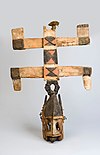Traditional African religion and other religions
| Part of a series on |
| Traditional African religions |
|---|
 |
Traditional African religions have shared notable relationships with other religions, cultures, and traditions.
Throughout the history, they are often noted for having one of the oldest presence in the world, and also applauded for their tolerance to other religions.[1][2]
Hinduism[edit]
Like Hinduism, the traditional African religion recognizes the presence of one supreme deity as well as the existence of God in multiple aspects.[3]
Traditional Igbo doctrine of reincarnation and connection to the spiritual mortal identity of the culture, themes about spiritual instrumentality based on the traditional Igobo beliefs and practices with the Hindu mantra, specifically the doctrine in the creative power of the spoken word are identical.[4]
Christianity[edit]
God is esteemed by both African religion and Christianity as both the very ground of being and the source of life. Anthropology is the basic starting place for both religions, human beings are the temporal mirrors and mediators (imago Dei) of God in the feature world.[5]
The Christian idea of church has similarities with African traditional life in which brotherhood and the extended family play a central role. The Church is the Christian family, in which all are accompanied to one another through belief and baptism in Jesus Christ. The Church also combines those who have died and those who still live. This is parallel view to the African view of the family of both the living and the omitted.[6]
Islam[edit]
African traditional religion is often regarded to have influenced African Islam and vice versa. Islam has been in Africa for so long and has become so acculturated to the African landscape that some scholars have argued that it is a traditional African religion.[7]
Conversions to Islam were generally pacific in nature and heavily incorporated pre-Islamic rituals and beliefs. Beliefs in local myths, spirits and magic often remained intact and was even approved if it didn't compromise the preeminence of Allah.[8][9] Many African peoples often equated their remote high god with Allah.[8] The continuation and active participation of Muslims in traditional masking events, the maintenance of local shrines (Islamic and pre-Islamic), and other rituals is common throughout Africa.[10]
Traditional African religion still has notable traces in northern Africa. Followers of African religion in Muslim dominated areas can be found, adhering their beliefs, rituals, magic, medicines. Generally they have adopted the Muslim way of dressing but in matter of deeper subjects such as life, birth, marriage, death, they remain the followers of African religion.[11]
Buddhism[edit]
Relations of African religion with Buddhism dates back to 17th century. After the establishment of the Dutch settlement at Cape Agulhas, some Buddhists paid short, coincidental visits to the Cape Agulhas - such as the few Thai monks who were aboard the Portuguese ship which ran aground off.[12]
Like Hinduism, Akan tradition shares belief in reincarnation with Buddhism.[13]
References[edit]
- ^ Religious Plurality in Africa: Essays in Honour of John S. Mbiti. Walter de Gruyter. 1993. p. 67.
- ^ Ali AlʼAmin Mazrui, Christophe Wondji (1993). Africa Since 1935. University of California Press. p. 502. ISBN 9780435948146.
- ^ Sushama Londhe (2008). A Tribute to Hinduism: Thoughts and Wisdom Spanning Continents and Time about India and Her Culture. p. 79.
- ^ "Gendering Global Transformations: Gender, Culture, Race, and Identity", p. 114, by Chima J. Korieh, Philomina E Okeke-Ihejirika, publisher = Routledge
- ^ Emmanuel K. Twesigye (1996). African religion, philosophy, and Christianity in Logos-Christ: common ground revisited. Peter Lang Publishing. p. 9.
- ^ "Introduction to African Religion", by John S. Mbiti, p. 190 publisher = Heinemann, [1]
- ^ Thomas, Douglas E. (2005). African Traditional Religion in the Modern World. McFarland. p. 125. ISBN 978-0-7864-1835-0.
- ^ a b Lewis, I. M. (2017). "Introduction: Islam and Traditional Belief and Ritual". Islam in Tropical Africa. Routledge. pp. 60–75. ISBN 978-1-315-31139-5.
- ^ Insoll, Timothy (2003). The Archaeology of Islam in Sub-Saharan Africa. Cambridge University Press. p. 398. ISBN 978-0-521-65702-0.
- ^ Bravmann, René A. (1974). Islam and Tribal Art in West Africa. CUP Archive. ISBN 978-0-521-29791-2.
- ^ "An Introduction to African Religion (2nd Edition)", by John S. Mbiti, p. 191 publisher = East African Publishers
- ^ Piet Meiring (1996). A World of Religions: A South African Perspective. Kagiso Publishers. ISBN 9780798639347.
- ^ Yoshinobu Hakutani (2011). Cross-Cultural Visions in African American Literature: West Meets East. Palgrave Macmillan. p. 5.
Bibliography[edit]
- African traditional religion and Christianity in a changing world: issues in comparative religion by Joseph S. Gbenda, 1997
- African Traditional Religion in South Africa: An Annotated Bibliography by David Chidester [2]
